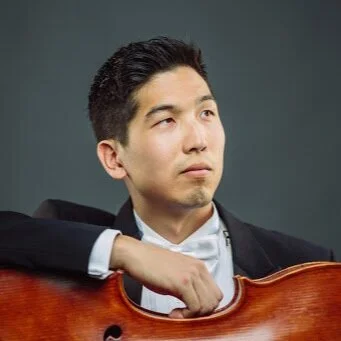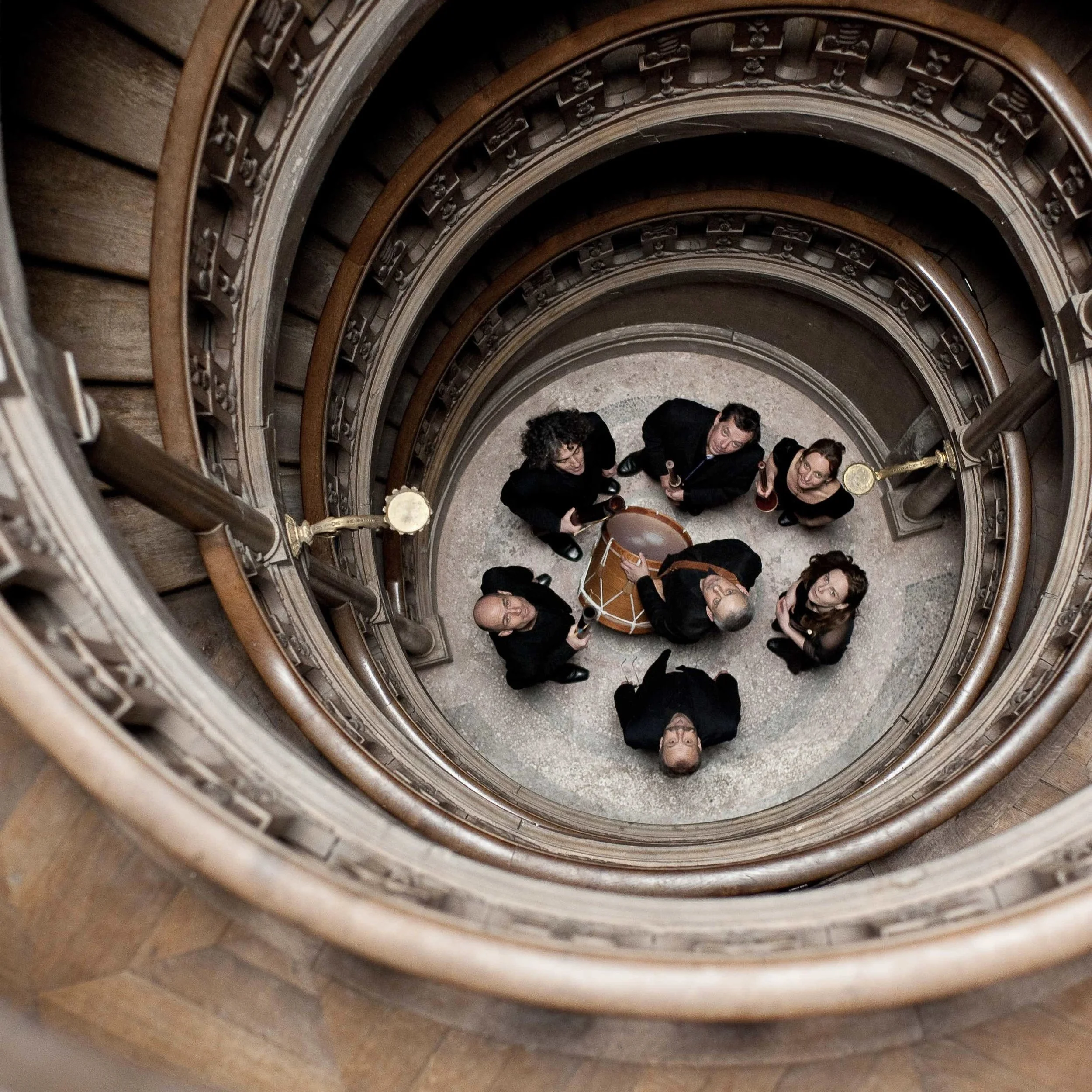Vetta Chamber Music's Dream Piano Trios celebrate composers at the height of their powers
The online performance also pays tribute to late cellist Eugene Osadchy
Cellist Brian Yoon and pianist Arthur Rowe
Vetta Chamber Music streams Dream Piano Trios - A Tribute to Eugene Osadchy from November 26 to 29.
Theatres may be shuttered for the next few weeks, but a Vancouver chamber-music ensemble will be streaming a program with both a dream team and a dream theme—a virtual escape to be enjoyed from the comfort of your own home.
Joan Blackman
Stir caught up with violinist and artistic director of Vetta Chamber Music, Joan Blackman, pianist Arthur Rowe, and cellist Brian Yoon to learn more about the show, their personal connections to the pieces, and to talk about the challenges and positives of “going virtual”.
The artists rehearsed together in October and the concert was recorded on Halloween day at an otherwise empty Chan Centre for the Performing Arts.
“It’s been an adventure!” Vancouver-based Blackman told Stir over the phone of the process of moving their entire 2020-21 season online. But despite a steep learning curve, she says Vetta’s ultimately grateful it made the decision to go virtual.
There have been challenges with pre-recording concerts. Blackman admits that introducing works to four cameras was a bit unnerving at first. She adds, “The saddest thing for me is not having the audience, it’s really hard to imagine we’re playing for an audience. We end and there’s no clapping.”
There have been positive outcomes about the shift to online performances, though. For one, Vetta has already begun to see new audience members from outside of Vancouver, garnering interest from all over BC. It’s also been able to bring music to those who might not otherwise have access to Vetta concerts, such as seniors in residences. “The smaller presenters have no live concerts—and audiences are hungry for music,” Blackman says.
The program begins with Joseph Haydn’s Piano Trio No. 41 in E flat Minor, nicknamed “Jacob’s Dream” for its reference to the biblical story in which Jacob sees a ladder reaching to heaven. “The reference is actually a joke on a violinist of the time who was known for his exaggerated sense of prowess in the upper registers,” Blackman says. “The ladders would be represented by passagework that climbs to the high registers in the violin and doesn’t ever come down!”
The Haydn is followed by Johannes Brahms’ masterful Piano Trio in C Minor, Op. 101. Victoria-based Rowe, who is a professor at the University of Victoria and artistic director of the Victoria Summer Music Festival, describes the work as full of beauty and passion: “The first movement begins with an explosion of sound and this energy is found again in the fourth movement. In between, the second and third movements offer beautifully contrasting characters and melodies.”
Reinforcing the dream theme throughout the program is the final work, Franz Schubert’s Piano Trio in E flat Major, Op. 100. Blackman quotes pianist and scholar Alfred Brendel who, when comparing Schubert to Beethoven, said, “Beethoven composes like an architect, Schubert like a sleepwalker… in Beethoven’s music, we never lose our bearings, we always know where we are; Schubert on the other hand puts us into a dream.”
Schubert’s trio is a huge work that takes 45 minutes to perform. Demonstrating the composer’s mastery of song, Rowe describes, “The gorgeous melodies and emotions which touch our souls, are everywhere.”
“It is a masterpiece, and like other cellists,” concurs Yoon, who is principal cellist of the Victoria Symphony, “I am grateful that Schubert decided to assign the first statement of the famous theme in the second movement to the cello.” The theme Yoon refers to is a beautiful melody, inspired by a Swedish folksong, Se solen sjunker (“The setting sun'“), that will have listeners humming for days.
“These three trios are all a dream to play, a dream to listen to, because they are all masterpieces by composers at the height of their powers,” says Blackman, summing up the program. “Haydn plays with light and dark, Brahms expresses with the ultimate conciseness, and Schubert ambles around from the field of dreams to wildly dramatic emotions, taking us on a long but timeless journey.”
The program is particularly meaningful to Blackman, and not just because she has played the program numerous times with Rowe and a few different cellists, but never as part of Vetta’s series. The concert is dedicated to cellist Eugene Osadchy, co-founder of Vetta, who sadly passed away on October 3. This program was to be Vetta’s season finale concert in May, which never took place due to the pandemic. But Blackman had learned of Osadchy’s illness a few months prior to May and decided to move the much anticipated program to the fall with Yoon on the cello.
“This program has become a very personal tribute to a great cellist and human being,” she says.
For his part, Rowe recounts, “The first time I performed the Schubert was with Eugene in New York as part of a series called Bargemusic, where concerts take place on a real barge which still floats in the harbour. It was a ‘moving’ experience in every way!”
Chemistry between the musicians is crucial in chamber music. When asked about the experience of performing with Blackman and Rowe on this concert, Yoon said, “I had worked with Joan and Art separately, but this was our first time working as an ensemble. I admire Joan's commitment to detail and expression; Art has a beautiful touch at the keys and his sensitivity to balance makes everything work naturally. It was a privilege to perform this program with such wonderful musicians.”
The hope is to return to live concerts next season, but Vetta may continue to record everything, even after the pandemic ends. The high-quality videos offer greater detailed perspectives than a live concert and viewers can watch and re-watch portions of concerts. For Blackman, keeping the intimate nature familiar to Vetta regulars is crucial. The important “afterwards”, where the audience gathers post-concert to talk about the music and the experience, is re-created virtually with a live online “fireside chat”, taking place Sunday, November 29, at 2 pm.
While everyone has been affected by the pandemic in some way, virtual concerts are a way forward, Rowe says.
“Musicians are all eager to perform again for a live audience and it is a very different feeling to be playing for a microphone,” he says. “However we take solace in the fact that we can still play for and to each other, even in recorded situations.”
The pandemic has also presented opportunities for growth and learning. Yoon, while initially discouraged by cancelled concerts and spending less time with his instrument, eventually took the opportunity to explore the technical side of recording.
“When videos of musicians playing together via separately recorded tracks began popping up, I was inspired to learn the basics of audio and video recording and editing,” Yoon expands. “After putting together a couple of pieces on my own, I invited a cellist in LA to collaborate on a video; it was actually a lot of fun hearing the parts come together. I am fortunate to belong to an orchestra, the Victoria Symphony, that has been recording and streaming concerts for a virtual season since September.”
Blackman, too, has been taking the time to learn something new—chord stacks for one of Vetta’s upcoming jazz and tango concerts.
“We’re really happy that we can still share what we do—our music—with people, in these times,” she says. “Music is so important right now.”










